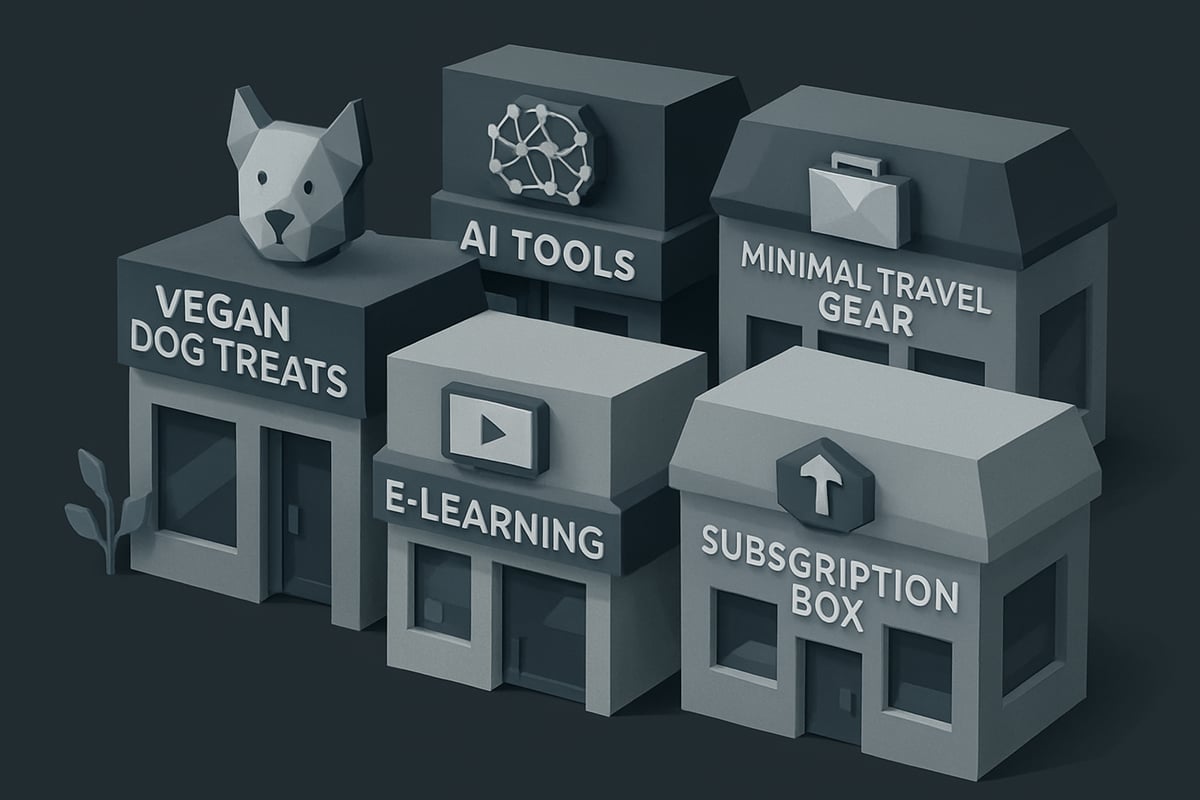Standing out is tougher than ever in 2025. Businesses of all sizes are searching for ways to rise above the noise and win loyal customers.
Many entrepreneurs, startups, and even established brands struggle to grasp the real meaning of niche in business. Is it just about picking a narrow audience, or does it go deeper?
Mastering your niche can unlock higher profits, cut down on competition, and create devoted fans who return again and again.
This guide is here to clear up the confusion. You’ll discover what a business niche truly is, why it matters, and how to find one that fuels lasting growth.
We’ll cover the meaning of niche in business, its impact on success, a step-by-step process for identifying your niche, real-world examples, and the top trends shaping 2025.
What Is a Niche in Business?
Understanding the meaning of niche in business is the first step toward building a brand that stands out in 2025. With markets more crowded than ever, knowing your niche is like having a compass in a dense forest: it keeps your business moving in the right direction.

Defining a Business Niche
The meaning of niche in business refers to a focused segment of a broader market where a company specializes its products, services, or expertise. Unlike an industry, which is a large category like "healthcare" or "technology," a niche zeroes in on a specific need or audience within that industry.
A niche is not the same as a target market. While a target market describes the group of people you aim to serve, a business niche defines the unique solution or specialization you offer to that group. Specialization is essential, as it allows businesses to stand out and become the go-to choice for a specific problem or desire.
Niches can be based on different factors:
- Demographics: Age, gender, income level (e.g., skincare for men over 50)
- Interests: Hobbies or lifestyles (e.g., vegan skincare)
- Needs: Specific problems (e.g., eco-friendly packaging for small e-commerce brands)
Some popular examples that illustrate the meaning of niche in business include vegan skincare lines, companies producing compostable packaging, and AI-powered content creation tools. These businesses thrive by serving a well-defined audience with unique needs.
Types of Niches
When exploring the meaning of niche in business, it's important to recognize the variety of niche types available. The two main categories are product-based and service-based niches. For example, a product-based niche might focus on minimalist travel gear, while a service-based niche could specialize in remote bookkeeping for freelancers.
Micro-niches are gaining popularity, as they target even narrower segments, such as gluten-free vegan dog treats or AI-powered tools for TikTok content creators. B2B niches serve other businesses, like SaaS platforms for HR teams, while B2C niches cater directly to consumers, such as subscription coffee boxes.
Geographic niches focus on specific locations, like organic produce delivery in urban neighborhoods. Psychographic niches revolve around values or lifestyles, such as eco-conscious consumers. According to IBISWorld, niche markets are growing twice as fast as broad markets in several sectors, underlining the strategic value of specialization.
Here's a quick comparison table:
| Niche Type | Example | Audience |
|---|---|---|
| Product-based | Minimalist backpacks | Travelers |
| Service-based | Virtual wellness coaching | Remote workers |
| Micro-niche | Keto snacks for athletes | Fitness fans |
| B2B | AI tools for HR | Companies |
| B2C | Vegan dog treats | Pet owners |
Understanding these distinctions helps you better grasp the meaning of niche in business and identify where your strengths fit best.
Niche vs. Mass Market: Key Differences
Choosing between a niche and a mass market approach is one of the most important decisions for any business. The meaning of niche in business is all about focus, while a mass market aims for broad appeal.
Targeting a niche offers clear advantages: less competition, more loyal customers, and the ability to charge premium prices for specialized offerings. However, niches can limit your potential audience size. Mass market brands, on the other hand, reach more people but face tougher competition and higher marketing costs.
Consider the case of Dollar Shave Club, which targeted a specific group—men seeking simple, affordable razors—versus Gillette, a mass-market giant. Dollar Shave Club’s niche strategy allowed it to build a devoted customer base and disrupt a crowded industry.
For a deeper look at the tradeoffs, see this detailed analysis of generalist vs. specialist in business.
Ultimately, understanding the meaning of niche in business empowers entrepreneurs to make smarter choices, whether they opt for a laser-focused approach or a broader reach.
Why Finding the Right Niche Is Crucial in 2025
In 2025, the meaning of niche in business is more important than ever for entrepreneurs and brands. As markets grow crowded and customer expectations rise, choosing the right niche can make or break your success. Let’s explore why finding your business niche is essential in today’s landscape.

Competitive Advantages of Niching Down
Focusing on a specific market segment gives your business a clear edge. The meaning of niche in business is all about specializing, which means less direct competition and more focused messaging. When you niche down, your marketing resonates better, and your offerings stand out.
Benefits include:
- Reduced competition, letting you dominate a specific space
- Easier customer acquisition, since your audience is well-defined
- Higher pricing power, as specialized solutions justify premium prices
Recent data shows 70% of small businesses that focus on a niche report increased profitability. This is proof that understanding the meaning of niche in business leads to real financial gains and a more defensible brand.
Niche Markets and Customer Loyalty
One significant reason the meaning of niche in business matters is its impact on customer loyalty. When you serve a specific group, you can build deeper relationships and understand their needs better than broad competitors.
Take Peloton as an example. By focusing on connected fitness communities, Peloton created a passionate user base that feels part of something unique. Niche brands foster trust more quickly, turning customers into advocates who spread the word and return for repeat business.
The meaning of niche in business is not just about selling—it's about creating a loyal community that values your expertise and personal touch.
Adapting to Market Changes in 2025
Markets are shifting fast. Personalization and technology are driving new consumer expectations, and the meaning of niche in business is evolving. Economic changes and tech innovations are opening doors to micro-niches, allowing businesses to target hyper-specific groups.
For example, 60% of new digital products in 2025 are launched in micro-niches, according to Gartner. This trend highlights how quickly the landscape is changing. Brands that embrace micro-niches can stay ahead, while those clinging to broad strategies risk falling behind.
Understanding the meaning of niche in business means staying agile and ready to pivot as new opportunities emerge.
Risks of Not Having a Clear Niche
Ignoring the meaning of niche in business comes with real risks. Without a clear niche, your brand message becomes diluted, and marketing spend is often wasted. You’ll struggle to stand out, making it hard to attract and retain customers.
A classic example is the difference between generic e-commerce stores and thriving niche brands. Generic stores often fail to connect with any audience, while niche brands carve out loyal followings and see steady growth.
To avoid these pitfalls, focus on the meaning of niche in business, ensuring your brand is targeted, memorable, and well-positioned for long-term success.
How to Identify and Validate Your Business Niche: Step-by-Step Guide
Finding the right business niche is the cornerstone of sustainable growth. The meaning of niche in business goes beyond a simple category—it’s about carving out a specialized space where your expertise meets real market demand. This step-by-step guide will help you discover, test, and refine your niche so you can stand out, attract ideal customers, and build a brand that lasts.

Step 1: Self-Assessment and Market Research
Start by looking inward. Ask yourself what skills, passions, and expertise you bring to the table. The meaning of niche in business often starts with your unique value—what can you offer that others can’t?
Next, explore the market. Use tools like Google Trends, SEMrush, and social listening platforms to spot rising topics and unmet needs. Look for gaps where customer pain points aren’t being addressed. For example, the surge in AI-powered educational tools for remote learners emerged from a blend of tech skills and a growing remote education demand.
Checklist for Step 1:
- List your top strengths and interests.
- Research trending topics and underserved markets.
- Identify problems you’re passionate about solving.
By combining self-assessment with data-driven research, you create a foundation for a niche that’s both meaningful and profitable.
Step 2: Define Your Ideal Customer
Once you have a general direction, dive deep into who your niche will serve. The meaning of niche in business is closely tied to understanding the specific audience you want to help.
Build detailed customer personas by considering demographics, interests, and behaviors. What are their pain points? What motivates them to buy? Use surveys, interviews, and social media polls to validate your assumptions.
Persona Creation Table:
| Attribute | Example |
|---|---|
| Age Range | 25-40 |
| Interests | Eco-friendly living |
| Pain Points | Lack of sustainable packaging |
| Buying Habits | Shops online, values ethics |
Businesses with clear personas are twice as likely to exceed revenue goals (HubSpot, 2024). By putting your audience at the center, you make every decision more focused and effective.
Step 3: Analyze the Competition
No niche exists in a vacuum. To refine the meaning of niche in business for your brand, map out the competitive landscape. Identify both direct and indirect competitors—those offering similar solutions or targeting the same audience.
Study their strengths and weaknesses. What are their unique selling points? Where are they falling short? Look for underserved segments or customer complaints that you can address better.
Tips for Competitive Analysis:
- Monitor reviews and testimonials.
- Benchmark pricing and features.
- Seek out forums or communities for insider feedback.
For example, niche coffee subscription services have thrived by focusing on curated, high-quality beans, while mainstream brands often overlook personalization.
Step 4: Test and Validate the Niche
Before going all-in, it’s crucial to test your idea. The meaning of niche in business is proven through real-world validation. Launch a minimum viable product (MVP) or a pilot service to gather feedback. Use pre-sales, waitlists, or crowdfunding campaigns to gauge interest and willingness to pay.
Remember, 42% of startups fail due to lack of market need (CB Insights, 2024). Validation reduces risk and helps you adapt quickly.
For a detailed breakdown of how to move from idea to launch, check out the actionable steps to sell in your niche for proven methods and tips.
Validation Methods:
- Offer a beta version to early adopters.
- Collect direct feedback and iterate.
- Track engagement and sales metrics.
Testing ensures you’re solving a real problem and building momentum before scaling up.
Step 5: Refine and Position Your Brand
After validation, it’s time to fine-tune your brand. The meaning of niche in business comes alive when you clearly communicate your unique value. Develop a value proposition that highlights how your solution stands out.
Position your messaging around the specific benefits your niche offers. Optimize marketing channels—whether it’s Instagram for visual brands or LinkedIn for B2B solutions—to reach your audience where they spend time.
Brand Refinement Checklist:
- Craft a compelling elevator pitch.
- Use visuals and language that resonate with your niche.
- Monitor results and continuously improve.
For instance, eco-friendly pet product brands succeed by emphasizing sustainability and building loyal communities around shared values.
Real-World Niche Business Examples and Case Studies
Finding the true meaning of niche in business comes alive when you look at real-world examples and case studies. These stories reveal how niche-focused strategies drive success, where others stumble, and how brands decide when to expand or pivot.

Successful Niche Businesses
The meaning of niche in business is best illustrated by brands that focus on a specific audience or solution. Let’s look at a few standout examples:
| Business Name | Niche | How They Stand Out | Growth Highlight |
|---|---|---|---|
| Notion Templates | Productivity for creators | Custom digital tools | $1M+ in sales/year |
| Wild Earth | Vegan dog treats | Plant-based pet nutrition | $10M+ in funding |
| Nomatic | Minimalist travel gear | Streamlined, durable design | 7-figure Kickstarter |
| SlidesAI | AI slideshow tool | Fast, automated presentations | 100k+ users in 1 year |
| Teachable | E-learning platform | Course creation for all | $100M+ paid out to creators |
Teachable, for example, seized the e-learning boom by catering to solo educators and small businesses. This laser focus allowed them to grow rapidly as the global e-learning market projected to reach $319.16 billion by 2025 continues to expand.
These businesses identified gaps in crowded markets, understood their audience deeply, and delivered specialized value. That’s the real meaning of niche in business.
Lessons Learned from Niche Failures
Not every niche business is a runaway success. Some stumble due to mistakes that are surprisingly common. Here’s what can go wrong:
- Too narrow of a focus: If your audience is tiny, there may not be enough demand.
- Ignoring market validation: Skipping customer research can mean building something no one wants.
- Weak differentiation: If your product is too similar to competitors, it gets lost in the noise.
- Failure to adapt: Markets change, and inflexible brands can get left behind.
A classic example is the glut of generic subscription boxes. Many failed because they did not define the meaning of niche in business for their brand, offering products without a unique spin or targeting an oversaturated audience.
Entrepreneurs who succeed in niche markets often embrace a growth mindset. They learn quickly from early missteps, stay close to their customers, and adapt based on feedback. For more on this approach, check out the entrepreneurship mindset for niches.
Niche Expansion: When and How to Broaden
What happens when your niche starts to feel crowded, or growth slows? Recognizing when to expand is crucial to sustaining momentum and staying true to the meaning of niche in business.
Signs your niche might be saturated:
- Rapid increase in direct competitors
- Declining engagement or conversion rates
- Customer feedback asking for broader offerings
Smart brands often expand by entering adjacent markets. For instance, a SaaS tool that began as a scheduling app for freelancers might grow into a full suite for remote teams. They keep their core audience while carefully adding features that appeal to a slightly wider group.
The key is to stay focused on your strengths and not lose the trust you have built. Niche expansion is about evolution, not abandoning your roots. Mastering this balance is a hallmark of brands that truly understand the meaning of niche in business.
Emerging Niche Trends and Opportunities for 2025
The business world is shifting rapidly, and understanding the meaning of niche in business has never been more critical. As we look toward 2025, several emerging trends are shaping how entrepreneurs choose and grow their niches. From digital products to sustainability, these trends offer both inspiration and practical opportunities.
Digital Product Niches on the Rise
Digital products are leading the charge in niche innovation. With low overhead and global reach, entrepreneurs are launching AI-generated content tools, micro-education platforms, and remote work solutions at record speed. Statista projects digital product markets will grow exponentially in 2025, driven by demand for automation and personalization.
One standout example is the surge in faceless AI video tools, which are experiencing 124.1% yearly growth. If you want a deep dive into digital product opportunities, check out Digital product niches explained. Understanding the meaning of niche in business within the digital space can help you find your own unique angle.
Sustainability and Eco-Conscious Niches
Consumers are seeking brands that align with their values, making sustainability an essential part of the meaning of niche in business. Eco-friendly products like compostable packaging and carbon-neutral SaaS are gaining traction.
According to Nielsen, 65% of consumers now prioritize sustainability when making purchasing decisions. Businesses that focus on ethical sourcing and green innovation are capturing loyal audiences. Examples include refillable household cleaners and upcycled fashion accessories.
Health, Wellness, and Personal Development Niches
Health and wellness continue to dominate niche trends. From biohacking supplements to niche meditation apps for specific professions, there is growing demand for tailored solutions. The meaning of niche in business here is about zeroing in on a specific need, such as mental wellness for remote workers or fitness plans for busy parents.
Online learning and micro-coaching platforms are also expanding, offering targeted support for personal growth. These niches thrive on community engagement and ongoing education.
AI, Automation, and Tech-Driven Niches
AI and automation are not just buzzwords—they are creating entirely new micro-niches every year. Businesses are leveraging AI UGC testimonial generators, automated social media tools, and advanced analytics platforms to carve out space in crowded markets.
The global data analytics market, for instance, is projected to reach $132.9 billion by 2026, showing just how fast tech-driven niches are expanding (Global data analytics market projected to reach $132.9 billion by 2026). Mastering the meaning of niche in business within tech means staying ahead of these fast-moving waves.
Community-Driven and Membership Niches
The rise of paid communities and exclusive membership products is a defining trend for 2025. Entrepreneurs are creating spaces for remote workers, hobbyists, and industry specialists to connect, learn, and collaborate.
For many, the meaning of niche in business is about fostering belonging and ongoing value. Examples include mastermind groups for SaaS founders and subscription-based creator communities. The focus is on engagement, shared learning, and peer support.
How to Spot and Capitalize on Niche Trends
Spotting the next big niche requires a mix of data analysis and creative intuition. Use tools like Google Trends, social listening platforms, and industry reports to track emerging interests. Look for gaps where customer needs are not being met.
Successful entrepreneurs stay agile and continuously adapt their offerings. By understanding the meaning of niche in business, you can quickly pivot to seize new opportunities and build a loyal following. Remember, the best niches often emerge from solving real problems or serving overlooked communities.
If you’re feeling inspired to carve out your own niche after reading this guide, you’re already on the right track. Finding your place in the market is the first step to building a business that feels authentic and sustainable. At CreateSell, we help you go from idea to income by sharing real strategies for developing digital products and automating your sales. If you’re ready to take action and start turning your knowledge into a business you truly own, let’s make it happen together—Get Started today.